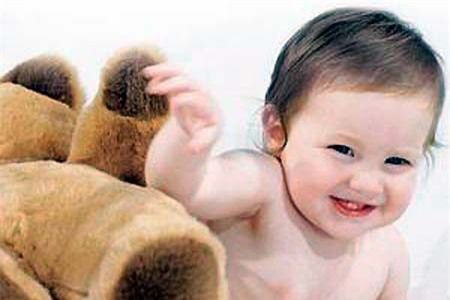How mothers take care of their children when their baby teeth are decayed
Many people think that tooth decay in baby teeth is normal and does not affect the growth of adult teeth.
The truth is that tooth decay not only damages baby teeth but also affects permanent teeth and gums of children.
 |
| Keep your child's smile natural with strong teeth (Illustration) |
Will affect permanent teeth
Baby Nhat Linh (Ninh Binh) is 5 years old this year, she is active and smiles a lot, but when there are many people she only smiles, every time she is too happy and laughs out loud she quickly covers her mouth with her hand. When asked, I found out that she has cavities and missing baby teeth.
Looking at her teeth, everyone was startled. All the front teeth on both jaws were decayed, black and rotten, some were still there and some were missing. Some had only a piece of root visible deep in the gums. The decayed and decayed teeth made it difficult for the little girl to eat. Every time she bit into something hard, she would clench in pain.
Ms. Thu, Nhat Linh's mother, said: "He also eats candy often but still brushes his teeth regularly. I took him to the doctor but the doctor said that when his permanent teeth grow, this condition will stop and the new teeth growing in will not affect him in any way."
Dr. Bui Ngoc Han - lecturer at the University of Medicine, Faculty of Dentistry said: Children have tooth decay and cavities due to many reasons, most of them are due to eating a lot of sweets, foods containing a lot of sugar, and regularly drinking carbonated drinks. These foods cause the enamel of children's teeth to be damaged, stained and gradually eroded.
Tooth wear and decay can also be caused by children lacking calcium and fluoride in their diet, leading to tooth damage. Teeth gradually decay and disappear until only a small amount of tooth root remains, which is deep in the gums, black, hard, and does not cause pain to the baby. Tooth wear and decay can also be caused by antibiotics used by the mother during pregnancy, by not knowing how to properly care for the child's teeth, and partly by genetic factors.
Not only Ms. Thu, but many mothers also believe that if their children's baby teeth are replaced by permanent teeth, there will be no problem. Their teeth will still be white and healthy as usual. Therefore, when children have cavities, most mothers only let their children brush their teeth normally without taking them to the dentist or paying close attention to it, causing their children's teeth to deteriorate day by day.
“Cavity teeth usually do not cause pain or aching, but only gradually wear away. When teeth are resorbed and decayed, harmful bacteria are also produced, causing damage to the gums and the formation of permanent teeth later on,” said Dr. Han.
Basically, worn, decayed baby teeth do not cause complications or tooth decay, but will limit the child's ability to chew and bite food, affecting the digestive system. Baby teeth are the teeth that guide the permanent teeth to grow later. If baby teeth fall out too early, or baby teeth are extracted before the permanent teeth have grown in time, the permanent teeth will grow crooked, out of order because the gums have closed, causing pain to the child.
Furthermore, unattractive teeth also make children feel self-conscious and unnatural in communication. Pronouncing the sounds S, T, V... is also more difficult, increasing the risk of children having a lisp.
What to do to have healthy teeth for children?
In order not to affect the complete development of children, parents need to pay special attention to oral hygiene for children. Right from birth, parents should regularly clean their children's teeth with a thrush tool. When children are over 6 months old, they should limit night feedings. After feeding, children should be given water to rinse their mouths.
In particular, children under 1 year old should not be given tetracycline antibiotics, because this antibiotic will increase the risk of permanent tooth decay.
When children have all their baby teeth (from 2 to 3 years old), they eat rice and many different types of food, so parents need to teach their children to brush their teeth and form a habit of brushing their teeth every day. After eating, children need to rinse their mouths with clean water and salt water every day.
A diet with calcium and fluoride is essential for bone development and makes children's teeth stronger. Eggs, fish, milk and dairy products are important ingredients in supplementing these nutrients for children in their daily diet. Limit children's intake of fast foods with lots of sugar and sweeteners such as cakes, candies, etc.
Dr. Han recommends that when children have tooth decay, they should take them to the dentist for examination and advice on oral care. Parents should take their children to the dentist every 3-6 months, brush their teeth regularly and use dental floss so that their children can always maintain a natural smile with strong teeth.
According to Alobacsi.vn






